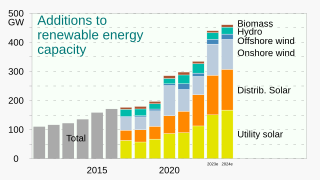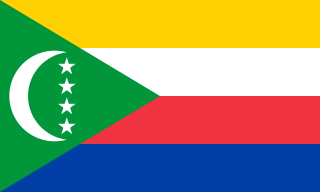
Renewable energy is energy that is collected from renewable resources that are naturally replenished on a human timescale. It includes sources such as sunlight, wind, the movement of water, and geothermal heat. Although most renewable energy sources are sustainable, some are not. For example, some biomass sources are considered unsustainable at current rates of exploitation. Renewable energy often provides energy for electricity generation to a grid, air and water heating/cooling, and stand-alone power systems. About 20% of humans' global energy consumption is renewables, including almost 30% of electricity. About 7% of energy consumption is traditional biomass, but this is declining. Over 4% of energy consumption is heat energy from modern renewables, such as solar water heating, and over 6% electricity.

Geothermal energy is the thermal energy in the Earth's crust which originates from the formation of the planet and from radioactive decay of materials in currently uncertain but possibly roughly equal proportions. The high temperature and pressure in Earth's interior cause some rock to melt and solid mantle to behave plastically. This results in parts of the mantle convecting upward since it is lighter than the surrounding rock. Temperatures at the core–mantle boundary can reach over 4000 °C (7200 °F).

The humidex is an index number used by Canadian meteorologists to describe how hot the weather feels to the average person, by combining the effect of heat and humidity. The term humidex was first coined in 1965. The humidex is a nominally dimensionless quantity based on the dew point.

LeBron Raymone James Sr. is an American professional basketball player for the Los Angeles Lakers of the National Basketball Association (NBA). Nicknamed "King James", he is widely considered one of the greatest players of all time and is often compared to Michael Jordan in debates over the greatest basketball player ever. James has won four NBA championships, four NBA MVP awards, four NBA Finals MVP awards, three All-Star MVP awards, and two Olympic gold medals. James has scored the most points in the playoffs, the second most career points, and has the seventh most career assists. He has been selected an NBA All-Star 18 times, to the All-NBA Team a record 18 times, and to the NBA All-Defensive First Team five times. He has competed in ten NBA Finals, the third most all time, including eight consecutively between 2011 and 2018. In 2021, James was selected to the NBA 75th Anniversary Team, and in 2022 became the first player in NBA history to accumulate 10,000 or more career points, rebounds, and assists.

A heat wave, or heatwave, is a period of excessively hot weather, which may be accompanied by high humidity, especially in oceanic climate countries. While definitions vary, a heat wave is usually measured relative to the usual weather in the area and relative to normal temperatures for the season. Temperatures that people from a hotter climate consider normal can be called a heat wave in a cooler area if they are outside the normal climate pattern for that area.

The 2003 European heat wave saw the hottest summer recorded in Europe since at least 1540. France was hit especially hard. The heat wave led to health crises in several countries and combined with drought to create a crop shortfall in parts of Southern Europe. The death toll has been estimated at more than 70,000.

District heating is a system for distributing heat generated in a centralized location through a system of insulated pipes for residential and commercial heating requirements such as space heating and water heating. The heat is often obtained from a cogeneration plant burning fossil fuels or biomass, but heat-only boiler stations, geothermal heating, heat pumps and central solar heating are also used, as well as heat waste from factories and nuclear power electricity generation. District heating plants can provide higher efficiencies and better pollution control than localized boilers. According to some research, district heating with combined heat and power (CHPDH) is the cheapest method of cutting carbon emissions, and has one of the lowest carbon footprints of all fossil generation plants.

Contemporary climate change includes both global warming and its impacts on Earth's weather patterns. There have been previous periods of climate change, but the current changes are distinctly more rapid and not due to natural causes. Instead, they are caused by the emission of greenhouse gases, mostly carbon dioxide and methane. Burning fossil fuels for energy production creates most of these emissions. Certain agricultural practices, industrial processes, and forest loss are additional sources. Greenhouse gases are transparent to sunlight, allowing it through to heat the Earth's surface. When the Earth emits that heat as infrared radiation the gases absorb it, trapping the heat near the Earth's surface and causing global warming.

The potential for exploiting geothermal energy in the United Kingdom on a commercial basis was initially examined by the Department of Energy in the wake of the 1973 oil crisis. Several regions of the country were identified, but interest in developing them was lost as petroleum prices fell. Although the UK is not actively volcanic, a large heat resource is potentially available via shallow geothermal ground source heat pumps, shallow aquifers and deep saline aquifers in the mesozoic basins of the UK. Geothermal energy is plentiful beneath the UK, although it is not readily accessible currently except in specific locations.

Geothermal power is electrical power generated from geothermal energy. Technologies in use include dry steam power stations, flash steam power stations and binary cycle power stations. Geothermal electricity generation is currently used in 26 countries, while geothermal heating is in use in 70 countries.
Bulgaria and Bulgarian National Television (BNT) once again decided to produce a special show to pick the Bulgarian entrant for the Eurovision Song Contest 2009, but in a different format than 2008's EuroBGVision. For 2009, a two-part process was used: the first part, Be a Star, consisting of a nine heats and three monthly finals chose the participants for Evroviziya 2009 which consisted of a semi-final and final and ultimately chose the Bulgarian entrant.

Energy in Finland describes energy and electricity production, consumption and import in Finland. Energy policy of Finland describes the politics of Finland related to energy. Electricity sector in Finland is the main article of electricity in Finland.

Castle is an American crime mystery/comedy-drama television series, that aired on ABC for a total of eight seasons from March 9, 2009, to May 16, 2016. The series was produced jointly by Beacon Pictures and ABC Studios.
Sweden participated in the Eurovision Song Contest 2010 with the song "This Is My Life" written by Bobby Ljunggren and Kristian Lagerström. The song was performed by Anna Bergendahl. The Swedish broadcaster Sveriges Television (SVT) organised the national final Melodifestivalen 2010 in order to select the Swedish entry for the 2010 contest in Oslo, Norway. After a six-week-long competition consisting of four heats, a Second Chance round and a final, "This Is My Life" performed by Anna Bergendahl emerged as the winner after achieving the highest score following the combination of votes from six international jury groups, five regional jury groups and a public vote.

The 2010 Northern Hemisphere summer heat waves included severe heat waves that impacted most of the United States, Kazakhstan, Mongolia, China, Hong Kong, North Africa and the European continent as a whole, along with parts of Canada, Russia, Indochina, South Korea and Japan during May, June, July, and August 2010. The first phase of the global heatwaves was caused by a moderate El Niño event, which lasted from June 2009 to May 2010. The first phase lasted only from April 2010 to June 2010, and caused only moderate above average temperatures in the areas affected. But it also set new record high temperatures for most of the area affected, in the Northern Hemisphere. The second phase was caused by a very strong La Niña event, which lasted from June 2010 to June 2011. According to meteorologists, the 2010–11 La Niña event was one of the strongest La Niña events ever observed. That same La Niña event also had devastating effects in the Eastern states of Australia. The second phase lasted from June 2010 to October 2010, caused severe heat waves, and multiple record-breaking temperatures. The heatwaves began in April 2010, when strong anticyclones began to develop, over most of the affected regions, in the Northern Hemisphere. The heatwaves ended in October 2010, when the powerful anticyclones over most of the affected areas dissipated.
Azerbaijan participated in and won the Eurovision Song Contest 2011 with the song "Running Scared" written by Stefan Örn, Sandra Bjurman and Iain James Farquharson. The song was performed by Ell and Nikki. The Azerbaijani broadcaster İctimai Television (İTV) organised the national final Milli Seçim Turu 2011 in order to select the Azerbaijani Eurovision entrant to represent the nation at the 2011 contest in Düsseldorf, Germany. 77 artists competed in the national final which consisted of nine shows: seven heats, a semi-final and a final. Five artists qualified to compete in the final on 11 February 2011 where a seven-member jury panel selected Eldar Gasimov and Nigar Jamal as the winners to represent Azerbaijan as a duet. The song "Running Scared" was later internally selected and presented to the public on 14 March.
The Men's 4 × 100 metre medley relay event at the 2010 Commonwealth Games took place on 9 October 2010, at the SPM Swimming Pool Complex.

Comoros competed at the 2012 Summer Olympics in London, England, which was held from 27 July to 12 August 2012. The country's participation at London marked its fifth appearance in the Summer Olympics since its début at the 1996 Summer Olympics. The delegation included two track and field athletes: Maoulida Darouèche and Feta Ahamada, and one swimmer, Ayouba Ali Sihame, all three qualified for the Games through wildcard places. Ahamada was selected as the flag bearer for the opening ceremony and Darouèche held it at the closing ceremony. Ahamada won her heat in the preliminary round of the women's 100 metres but was eliminated in the heat stages, while Darouèche and Sihame did not advance beyond the first round of their respective events.

Equatorial Guinea competed at the 2012 Summer Olympics in London, which was held from 27 July to 12 August 2012. The country's participation at London marked its eighth appearance in the Summer Olympics since its début at the 1984 Summer Olympics. The delegation included two track and field athletes, Benjamín Enzema and Bibiana Olama who both qualified for the Games via wildcard places because their fastest times did not meet the required qualification standards. Olama was selected as the flag bearer for both the opening and closing ceremonies. Both athletes did not advance beyond the first round of their respective events.















